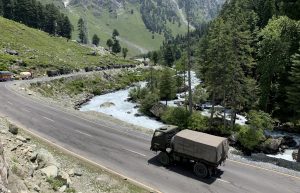The 13th round of talks between Indian and Chinese military commanders on October 10, which was to discuss disengagement of troops at Hot Springs, has collapsed in angry recriminations. The two sides blamed each other for the failure of the talks.
While the Chinese side slammed India for persisting with “unreasonable and unrealistic demands, which added difficulties to the negotiations,” the Indian side claimed that it had “made constructive suggestions” for resolving the dispute at various friction points in eastern Ladakh. Not only were the Chinese “not agreeable” to the Indian suggestion, but also they “could not provide any forward-looking proposals,” the Indian Army said in a statement issued a day after the talks.
The Indian and Chinese armed forces have been locked in a 17-month-long standoff in eastern Ladakh in the western sector of the Line of Actual Control (LAC), the de facto border between the two countries.
It was in late April of 2020 that PLA soldiers began crossing the LAC into the Indian side at several points in Ladakh, including the Galwan Valley, the north and south banks of Pangong Tso, Gogra Post, and Hot Springs. On June 14, tensions exploded in bloody fighting and resulted in loss of life on both sides.
The two sides have been engaging in talks over the past year to de-escalate tensions along the LAC by bringing about a disengagement of troops from “friction areas.”
Disengagement of troops was completed at Galwan Valley in July, the north and south banks of Pangong Tso in February, and Gogra Post in August.
An agreement on disengagement from Hot Springs was expected to emerge from the 13th round of talks. This did not happen. Differences also remain in Demchok and Depsang.
Previous rounds of talks did not always produce agreement; often even a joint statement didn’t materialize, indicating persisting differences. Yet even their separate statements included a few positive words. That was not the case with the 13th round, with both sides lashing out at each other in their statements. Both China and India have done away with even the pretense of commitment to talks. This is worrying.
In the months between the 12th and 13th rounds, there was a noticeable hardening of positions. Both engaged in muscle-flexing.
On August 30, around 100 PLA soldiers on horseback crossed the LAC at Barahoti in the middle sector. They reportedly entered 5 km into territory on the Indian side of the LAC, remained there for 3 hours, and damaged infrastructure. Indian forces did not push them back.
There was a “minor face-off” between patrolling parties of the two sides near Yangtse in the Tawang Sector in the eastern sector of the LAC on September 30. Indian forces detained several Chinese soldiers and then let them go after a few hours.
Then on October 9, India’s Vice President Venkaiah Naidu visited Tawang in the northeastern Indian state of Arunachal Pradesh. China lays claim to much of Arunachal Pradesh as South Tibet. Visits by Indian political leaders and foreign officials to Tawang have always raised hackles in Beijing. Naidu’s visit to Tawang, which came a day before the 13th round of talks, is bound to have annoyed the Chinese.
Was Naidu’s visit aimed at needling the Chinese in response to the Chinese intrusions in previous weeks at Barahoti and Tawang?
The Chinese response to Naidu’s visit came on Wednesday. The Chinese Ministry of Foreign Affairs warned India against “taking any action that would complicate and expand the boundary issue.”
India shot back soon after that “Arunachal Pradesh is an integral and inalienable part of India.”
“Indian leaders routinely travel to the state of Arunachal Pradesh as they do to any other state of India. Objecting to the visit of Indian leaders to a state of India does not stand to reason and understanding of Indian people,” the spokesperson of India’s Ministry of External Affairs, Arindam Bagchi, said.
A war of words is heating up.
Both sides have amassed troops and weaponry near the LAC. They are reported to have deployed around 50,000 soldiers in the forward areas. It is these soldiers that will bear the brunt of the collapse of the 13th round of talks.
They will have to spend the second winter in a row to maintain a vigil along the India-China border.

































